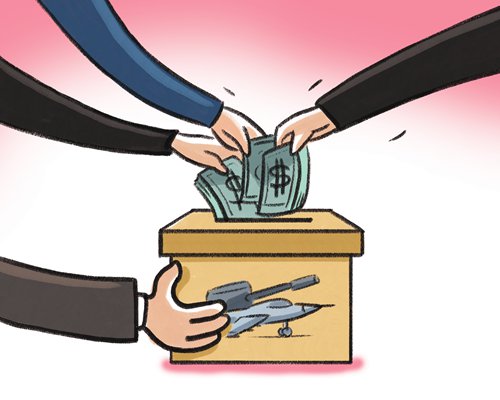
Illustration: Liu Rui/GT
Distribution of defense spending has been an important and long-lasting source of dispute between the US and its allies. How to share the cost of US overseas military presence is the bone of contention. After US President Donald Trump came to power, he took issue with US defense expenditure abroad, increasing pressure on its allies to pare it. The Trump administration has urged NATO members as well as Japan and South Korea to ramp up their defense spending.
The Trump administration is drawing up a "Cost Plus 50" formula, which lays down that countries "hosting US troops pay the full price of American soldiers deployed on their soil - plus 50 percent or more for the privilege of hosting them." This will lead to a significant rise in German and South Korean military spending.
The cost for South Korea which hosts 28,500 US soldiers has increased from $150 million in 1991 to an expected $924 million in 2019. Meanwhile, Germany currently needs to annually spend $1 billion, roughly 28 percent of the total cost, on about 35,000 US soldiers.
In fact, Trump's complaint against the burden of sharing military expenditure reflects a long-term strategic dilemma of US military presence abroad. After WWII, a rich and powerful US offered strategic protection to NATO members and its Asia-Pacific allies. Although these allies became economically stronger, they still rely heavily on Washington for their defense. In other words, these countries didn't adapt to changing defense needs and their military capabilities to assume commensurate defense responsibility. What's worse for the US is that these allies have been pampered and have formed their unique strategic culture.
As Robert Kagan observed in the book, Of Paradise and Power, due to the power gap between US and Europe, the two sides judged external threats differently that led to divergent views on international principles. This led to Europe paying less attention to defense matters.
There are two reasons why Trump made such demands on allies. First, it's the way Trump is - his preferences and style. He cannot accept allies taking advantage of the US. In Trump's opinion, US allies are wealthy countries that should spend more.
Second, a fresh geopolitical challenge has sprung up. Russia's activities in Europe in recent years have triggered concern and alarmed some Eastern European countries, prompting the Trump administration to reconsider how to deal with the situation. Under the "America First" policy, it is incumbent upon allies to assume more responsibility for their defense expenditure. The situation is similar in the Western Pacific, where the US faces a rapidly rising China and a reckless North Korea. The US will spend less if its allies bear more expense.
Trump could not have realized, however, that his moves would have a long-term impact on US military presence on the globe. US allies will increase their defense capability and loosen their military purse strings. Growing military strength will lead to more autonomy, which will be a huge challenge to the US as Washington will need to keep the alliance from splintering. The US will face the dilemma of letting allies be more independent or maintaining cohesion within the alliance.
Meanwhile, US dominance of the alliance will weaken. The US acts like a landlord, who collects a lot of money, while holding its head high. Washington's allies will eventually accept Trump's formula, unwillingly though. Particularly, South Korea and Japan may find nationalistic sentiments of their people prevail.
The author is an associate professor at the School of International Studies, and a research fellow at the National Academy of Development and Strategy, Renmin University of China. opinion@globaltimes.com.cn
